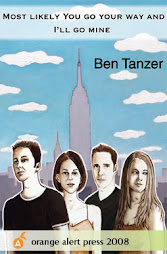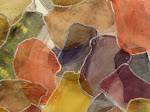
John Peter Kay
What inspires a writer to record a small piece of life that to some may be mundane or not worth the effort can vary, but the importance of the writer's surroundings can not be overstated. A moment or a view or an interesting individual has to feel unique to the writer, and in some way temporary enough to warrant a poem or a story. There are two events that can make the entire world unique, the birth of your first child and relocating to a foreign land. Writer John Peter Kay is from North East England, but he is currently living in Daejon, South Korea with his wife Kyong Lan. They are expecting their first child this July. There is inspiration around every corner, and John is attempting to record his experiences and share them with the world.
Recently, John was kind enough to answer a few of our questions on writing, South Korea, and his future.
Orange Alert (OA): Your writing style seems very conversational, how would you describe your style?
John Peter Kay (JK): I wouldn't know where to begin to describe my writing style. I'd leave that job to my readers, to the critics, publishers and magazine editors. Saying that though my writing used to be threaded though with surrealistic images or perspectives be it prose or poetry it was always tied down, held to the world by the building up of realistic observation and detail. For example, there may have been a two headed woman sat at the bar in the pub but her fingers were nicotine stained, her accent local and as rough as gravel and the lust holding me to her as real as the traffic going passed outside the grimy pub window. Now though I take my cue even more so from the world around me and leave the surrealism to others: the world is cruel, strange and beautiful enough as it is.
OA: Who are some of your biggest literary influences?
JK: The fact there was always a typewriter or two about the house when I was a child. I didn't use them as much as I should have but the fact that they were there with their letters keys all splayed out shiny or dusty for use. A smudge of ink on my fingers as I tried to change a ribbon. I remember my Dad pounding away on one of them trying to write his memoirs about his time in the army and being a long distance truck driver. He told me plenty of the stories but he never finished writing them or if he did he never let on. My Grandfather never set out to type up his memoirs but his stories about his capture and subsequent escape from being a prisoner of war in both Greece and Italy during WW2 are still percolating in the back brain until I can do them justice. Influences??? Bob Dylan for his imagery, the cubist eloquence of Highway61 Revisited and his playfulness. I know there's that old chestnut about whether his lyrics stand alone as poetry or not. I don't give a monkeys. I'm inspired and that's that. William S. Burroughs for his fierce scathing humour, savage take on the modern world and for facing death head on. The Scottish Poet Ivor Cutler for the intensity, the strangeness and the beauty of his work. One of his poems is from the point of view of butterfly raging against the world's most dangerous animal: man. Don Delillo. Kurt Vonnegut. Ray Bradbury for Death is a Lonely Business. The Marx brothers. James Kelman. Laurel and Hardy.
OA: How has the internet (blogs, lit mags, publishers etc) affected you as a writer?
JK: I don't really see that it has affected me as a writer other than to make it easier to find information, submit work or to contact someone on the other side of the globe. I still write long hand and when I mention my notebook it is just that, a notebook. Vulnerable to rain and snow and full of scribbled and scrawled observations, lists, dreams, quotes, missives, the odd sketch and general diary entries. Not a flat, sleek laptop of the same name.
OA: Do you listen to music while you write?
JK: Five or six years ago I would listen to music (possibly some scratchy opera 78s or Fats Waller) drink cheap, dry, white wine and smoke spliffs in that tiny kitchen with the view of the garden (we had no acess to) whilst hammering away on my imperial good companion typewriter, but now the only music I write to is the sound of passing traffic, the unbridled wailing of children playing out the back and occasionally my wife turning over in her sleep. I bought some CDs when I was back in England. In my friend Tom B's recordshop ( Sound It Out Records in Stockton, Cleveland) I found a compilation called Death Room Blues with great tunes from Leadbelly, Sleepy John Estes, Bukka White, Mississippi John Hurt, Blind Boy Fuller and more besides. I also purchased Neil Young's Tonight's The Night. He also did me a copy of the new Mogwai album, which is the soundtrack to the documentary film Zidane. From Folk Devils record shop in Whitby, North Yorkshire I bought the new Tinariwen album +10:1. They're Touareg from northern Mali in North Eastern Africa. I saw it in the shop window and had to have it.I'd heard a track on Andy Kershaw's show on BBC Radio 3. I recommend the band, the album and the DJ. Last but not least I received a copy of Woody Guthrie's Songs of Saccoand Vancetti from my other good friend Tom R in Brighton. Who also gave me a copy of a live recording of his ensemble who are noise merchant's going under the moniker Daguerreotype. That at least gives you a taste of what I'm listening to.
OA: How has the shift from England to South Korea affected your writing?
JK: Moving to South Korea has given my writing a whole new lease of life because everything is different, or so it seems from my jaundiced western eyes from greetings, the corner shop, the food on my plate, traffic, toilets, etiquette, booze, the landscape, everything. Also because I'm notliving in my own country I find there's less pressure on me. I can like the cliche says be who I want to be. And I want to be a writer, so I have time and just enough space to write.
OA: What's next for John Peter Kay ( ie publications, readings)?
JK: When I told my friend Mike that I only worked two days a week he challenged me to produce a first draft of a novel by the end of the year, so there's that. I'm also hoping to get my head down and write a story with or without the theme of memory. Then a few more inspired by my recent travels.The aim is to get a short story collection together again by the end of the year (if not sooner) and start sending it out to publishers and magazines. The key is to keep writing. Like Uncle Anton said write, write, write till your fingers break.
Bonus Questions:
OA: Coffee? if yes what is your favourite kind of coffee and what is your favourite coffe place?
JK: Of late it's been my drug of choice: double espresso. A good place to drink a coffee, though I haven't been there in many a moon is the cafe on the 10th floor of the Saeronam church in Manyon-dong in Daejon, South Korea. The coffee is good and strong. They do a lovely line in cookies encrusted with smarties ( bright, primary coloured children's sweeties, I don't know if you call them that in the U.S?). The place is ran by volunteers primarily well dressed middle aged women who are too busy talking to each other to bother me. And the view over west Daejon, the towers of the government complex bestows a calm upon on a person high up, free from the hubbub, insanity and suicidal tendencies of rush hour Korean style.
OA: What is the last great book you read?
JK: Howard Zinn's The People's History of The United States is one. The People's Act of Love by James Meek is another. Amusing Ourselves to Death by Neil Postman. Sorry I've given you three but they're all such great big juicy books, with ideas and writing you can get your teeth into.
For more information on John Peter Kay visit his blog, and for a sample of his writing check out the current issue of "Crush to Pulp" and he will also be in the May edition of Crush to Pulp.
+by+Nick+Volkert).jpg)

















No comments:
Post a Comment